Free Mobile App for Building Cognitive Skills
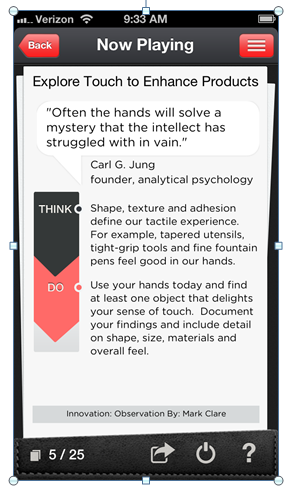 I’ve just launched NewHabits an iPhone and iPad App that delivers decks of flashcards for learning new skills and behaviors from experience. Each card in a deck explains what to THINK and DO to practice a new skill. All the cards are backed by research. You can play a card daily from your device. They take just minutes to use. As you play more cards the learning effects accumulate over time into significant new skills.
I’ve just launched NewHabits an iPhone and iPad App that delivers decks of flashcards for learning new skills and behaviors from experience. Each card in a deck explains what to THINK and DO to practice a new skill. All the cards are backed by research. You can play a card daily from your device. They take just minutes to use. As you play more cards the learning effects accumulate over time into significant new skills.
An example card from a deck for improving observation skills is shown to the right.
There are currently 7 decks in the NewHabits store, 2 are free and there are 6 more in development. Some relate directly to cognitive skills and should be of interest to readers of the Next Brain Blog, for example:
- Willpower: Science for maximizing self control
- Motivation: Science for maximizing the energy to act
- Observation: Use all five senses to deepen learning
- Reframe: Master advanced creativity techniques
- Interpret: Learn to make sense of experience
- Influence: Convince others to act on your ideas.
There is even a forthcoming deck on Brain Health: Achieve peak mental performance at any age. This deck will be written especially for readers of the Next Brain blog.
Many other decks are possible. I am actively looking for new or experienced authors interested in publishing skill-building decks on a royalty basis. Free training and support on how to create a deck is available.
If you use a Droid phone or tablet you can still get a detailed look at the App in a screen walkthrough.
I am interested to hear from readers that use the decks or want to create new ones. You can contact me directly at mark.k.clare@gmail.com or 260-433-7923.
Facebook Improves Mental Updating by 25%
An interesting preliminary study from the psychology department at the University of Arizona found that seniors trained to use Facebook showed measurable improvement in their cognitive abilities. More specifically:
“In the follow-ups, those who had learned to use Facebook performed about 25 percent better than they did at the start of the study on tasks designed to measure their mental updating abilities”
Mental updating is the ability to add and delete contents in your working memory. The study included a small group of seniors ages 68-91 with little or no prior Facebook experience. Participants friended only those in their group and made at least one short post daily.
Researchers believe that the constant information updating on Facebook and its relatively complex interface are responsible for the improvement. But more research is needed.
I am interested to hear from readers that use Facebook as a means to boost cognitive performance or maintain brain health.
Categories: Memory and Learning, Mental Focus, Older Adult, Software, Training Tags:
Measure How Well Your Brain Works
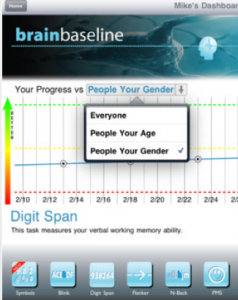 Cognitive Media has a free iPad application that takes you through a battery of scientific assessments of brain performance using game-like activities. There are over 14 assessments that:
Cognitive Media has a free iPad application that takes you through a battery of scientific assessments of brain performance using game-like activities. There are over 14 assessments that:
“…use the same laboratory analyses neuroscientists use to measure memory, attention, and processing speed, providing users with the ability to test their cognitive functioning.”
This is an excellent tool for any one interested in taking a systematic approach to improving brain function and cognitive performance. You can use it to periodically measure your attention, executive function, working memory, visual motor coordination, spatial processing and speed of processing. If the results improve you will have good evidence that your Next Brain efforts are paying off.
A version called Brainbaseline Pocket is due out for the iPhone. I plan on completing the assessments on that App and will blog about the results.
I am interested to hear from readers that have used Brainbaseline. How often to you re-take a given assessment to check for improvement?
Categories: Software Tags:
Are Brain Training & Brain Fitness Being Hyped?
 There are now many software programs available that claim to be able to improve memory or otherwise enhance your cognitive performance. The idea is that you workout with the software (sometimes a game) for your brain much like you workout with exercise equipment for your body. We have reviewed several of these on the Next Brain blog and always ask the question – do they work?
There are now many software programs available that claim to be able to improve memory or otherwise enhance your cognitive performance. The idea is that you workout with the software (sometimes a game) for your brain much like you workout with exercise equipment for your body. We have reviewed several of these on the Next Brain blog and always ask the question – do they work?
Unfortunately, the answer is not clear. Scientific studies are limited or produced mixed results. But brain training is a big business, ringing up hundreds of millions of dollars in sales annually. This means advertising claims can get a bit aggressive. The editor-in-chief of Psychology World makes this point well in his recent post, The New Snake Oil: Brain Training & Brain Fitness. It is worth a read. The bottom-line is,
be wary of ads that make strong claims about improving your brain function or cognitive performance.
Good advice for any product or service!
I am interested to hear from readers that have seen ads for braining training or fitness products that are over the top in the claims they make.
Categories: Cognitive Decline, Memory and Learning, Software Tags: brain training
Up Mental Processing Speed by 10% in 21 Days
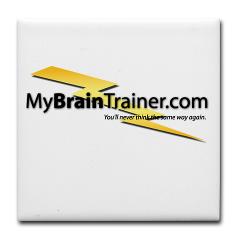 A new study from Swinburne University of Technology showed significant improvement in mental processing speed in a small group of older adults that used braining training software for 20 minutes every day for 21 days. Thirty four adults ages 53-75 years participated in the study using MyBrainTrainer software.
A new study from Swinburne University of Technology showed significant improvement in mental processing speed in a small group of older adults that used braining training software for 20 minutes every day for 21 days. Thirty four adults ages 53-75 years participated in the study using MyBrainTrainer software.
“We found an improvement in simple reaction time of about 10 per cent compared to the control group, which is quite a lot. The intervention improved speed of processing which translates to younger brain performance,”
Results were measured post-training as well as three weeks later. While this is a small study it does demonstrate a significant improvement cognitive performance.
Interested to hear from readers that use MyBrainTrainer. Does it help you think faster?
Categories: Cognitive Decline, Software, Training Tags: brain training
Use the Latest Science to Maintain Brain Health
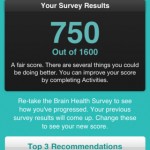 Do you have an iPhone or iPad and want to lower your risk of Alzheimer’s disease or other forms of dementia? Check out the the free BrainyApp. It let’s you apply the latest neuroscience to assess your risk and develop recommendations for keeping your brain and heart healthy.
Do you have an iPhone or iPad and want to lower your risk of Alzheimer’s disease or other forms of dementia? Check out the the free BrainyApp. It let’s you apply the latest neuroscience to assess your risk and develop recommendations for keeping your brain and heart healthy.
Not surprisingly the risk factors that the app uses are related to lifestyle and include diet, smoking, blood pressure, weight exercises and lack of mental activity. And the factors work together. For example, one study found that high salt diet combined with inactivity in older adults contributed to cognitive decline.
Interested to hear from readers that have used this app or similar apps to gain insight into how lifestyle choices impact brain health.
Categories: Cognitive Decline, Lifestyle, Older Adult, Software Tags:
Will Playing Video Games Boost Kid’s Creativity?
 The answer is yes according to recent research at Michigan State University. They studied 500 12-year-olds and found that playing video games increases creativity when it comes to drawing pictures and writing stories. The finding is robust:
The answer is yes according to recent research at Michigan State University. They studied 500 12-year-olds and found that playing video games increases creativity when it comes to drawing pictures and writing stories. The finding is robust:
“… regardless of gender, race or type of game played by the students, the study found a relation between video game playing and greater creativity.”
They also found no increase in creativity through the use of computers, the Internet or smart phones.
Interested to hear from readers that include video game playing in an effort to develop their children’s brain function and cognitive performance.
Categories: Child, Problem Solving, Software Tags: creativity, games
Cognitive Training uses Music to Boost Verbal IQ
Music is one of the best ways to charge up your cognitive performance in both the short and long term. What differentiates music from noise or other sounds? It is exactly its ability to authentically move our hearts and extend our minds. Music is brain boosting technology by definition. That’s why in the Next Brain blog we are always on the look out for applications that use music to improve brain function or enhance cognitive performance.
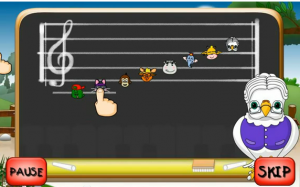 For example, a new study by The Royal Conservatory of Music in Canada, York University and others showed that students 4-6 years old experience a measurable increase in IQ after just 20 days of music-based cognitive training. The improvement showed up in before and after testing and EEG brain imaging.
For example, a new study by The Royal Conservatory of Music in Canada, York University and others showed that students 4-6 years old experience a measurable increase in IQ after just 20 days of music-based cognitive training. The improvement showed up in before and after testing and EEG brain imaging.
The music-based cognitive training included interactive cartoons that delivered lessons twice each day for one hour. A picture of the cartoon is included in this post. To see more watch a video.
While only one study, the results are significant. An impressive 90% of the 48 students in the study show improvement in verbal intelligence after just 40 hours of training. There was a control group and the differences showed up in an EEG that measure functional brain activity. The effects should be long lasting. For more details check out the press release on the Association of Psychological Science web site.
Interested to hear from readers that use music-based training programs.
Categories: Child, Music and Audio, Software, Training Tags: art
What is Your Brain Performance Index?
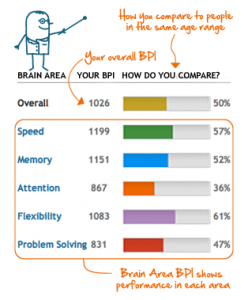 Lumosity, a leader in the growing field of cognitive training, has introduced the brain performance index. The index is an empirical and comparative measure of your ability to focus and sustain attention, processing speed, memory, problem solving skill and mental flexibility. You can set up an account and build your profile for free. If you want to know how you compare to others in your age group you need to subscribe.
Lumosity, a leader in the growing field of cognitive training, has introduced the brain performance index. The index is an empirical and comparative measure of your ability to focus and sustain attention, processing speed, memory, problem solving skill and mental flexibility. You can set up an account and build your profile for free. If you want to know how you compare to others in your age group you need to subscribe.
Like other instruments that assess your cognitive abilities, the brain performance index (BPI) gives insights into strengths and weaknesses. It should help you define goals for working on your next brain.
Interested to hear from readers that use the BPI or other assessment instruments to set goals for how best to achieve peak cognitive performance.
Categories: Memory and Learning, Mental Focus, Problem Solving, Software Tags: brain fitness
Student Reading Skill Doubles in 24 Days
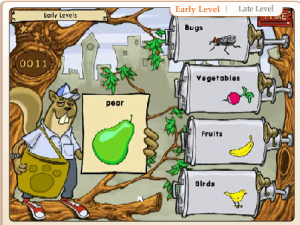 Scientific learning just published the results of a controlled study on Fast ForWord Reading Level 1. This is brain training software designed to boost the abilities of early readers such as students in first and second grade. It build skills with phonemes (sounds) and images, vocabulary knowledge and decoding and sequencing skills and even motivation for reading.
Scientific learning just published the results of a controlled study on Fast ForWord Reading Level 1. This is brain training software designed to boost the abilities of early readers such as students in first and second grade. It build skills with phonemes (sounds) and images, vocabulary knowledge and decoding and sequencing skills and even motivation for reading.
In the study over 200 first and second graders trained 48 minutes per day for 24 school days. When tested against a control group they scored nearly twice as well.
An impressive result especially since it is focused on the fundamental skill of phonological awareness. This involves recognizing, taking apart, adding and moving sounds. It supports high performance in both reading and writing.
Interested to hear from others that use specific techniques to build reading skills in children.
Categories: Child, Perception, Software, Training Tags: speed reading

